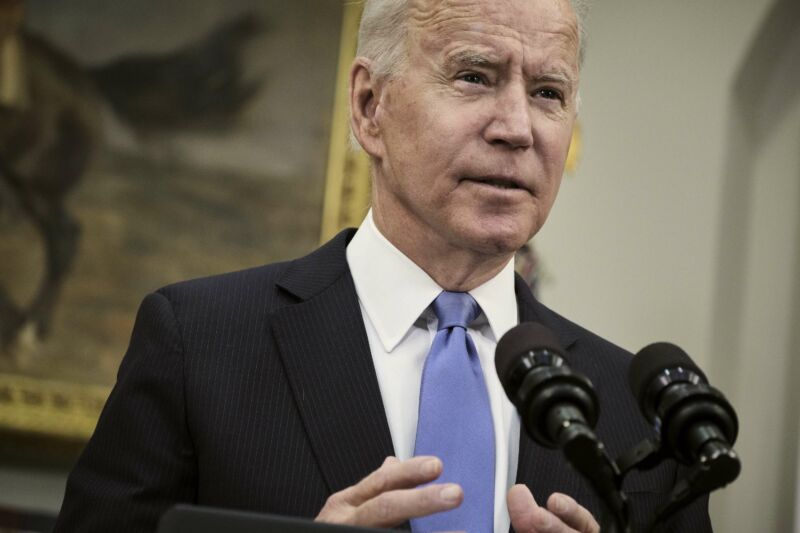
President Biden has cut his broadband-deployment spending proposal from $100 billion to $65 billion, matching the lower amount proposed by Republicans. But Republicans still object to Biden’s overall infrastructure spending plan and have consistently opposed the municipal broadband networks that Biden wants to prioritize in government-funded projects.
Biden “agreed to reduce the funding request for broadband to match the Republican offer and to reduce the proposed investment in roads, bridges, and major projects to come closer to the number proposed by the senators. This is all in the spirit of finding common ground,” White House Press Secretary Jen Psaki said on Friday during a media briefing.
Biden made the $100 billion broadband proposal on March 31 as part of his larger American Jobs Plan, saying the multi-year funding would pay for “‘future-proof’ broadband infrastructure in unserved and underserved areas so that we finally reach 100 percent high-speed broadband coverage.”
The White House informed Republicans of Biden’s willingness to cut $35 billion from his broadband proposal in a memo on Friday. “We believe we can still achieve universal access to affordable high-speed Internet at your lower funding level, though it will take longer,” the White House told Republicans, according to NPR. “Any funding agreement would need to be paired with reforms to ensure these investments create good jobs, promote greater competition, and close the digital divide.”
Biden cut his overall plan from $2.25 trillion over eight years to $1.7 trillion. That’s still about three times larger than the $568 billion Republican counteroffer, and Senate Minority Leader Mitch McConnell “has said he doesn’t see Republican lawmakers supporting spending much more,” NPR wrote.
Biden “believes that the extraordinarily wealthy, the companies that, many of whom have not paid taxes in recent years, can afford a modest increase to pay for middle-class jobs,” Psaki said. McConnell has opposed reversing any part of the 2017 corporate tax cut.
“Democrats could try to pass a spending proposal on party lines using Senate reconciliation rules, but several moderate Democrats, such as Sen. Joe Manchin of West Virginia, have made it clear to the White House they’d prefer a bipartisan plan,” the NPR article said.
Sen. Ed Markey (D-Mass.) pushed for the Senate to move ahead without any further cuts to Biden’s plan. “Despite President Biden’s efforts to engage with Republicans, they have shown no willingness whatsoever to negotiate in good faith with Democrats to confront the intersecting crises we face… Let’s not waste time trading the necessary scope and scale of this critical infrastructure package for Congressional Republican votes that have yet to and will never materialize,” Markey said.
Republicans oppose municipal broadband
Even though Biden’s new offer of $65 billion for broadband matches the amount proposed by Republicans, the size isn’t the only part likely to be opposed by the GOP. Instead of giving private ISPs the best shot at receiving funding, Biden proposed “prioritiz[ing] support for broadband networks owned, operated by, or affiliated with local governments, non-profits, and co-operatives—providers with less pressure to turn profits and with a commitment to serving entire communities.” This could be a major change from previous US spending programs that doled out billions to private Internet providers. Republicans have consistently fought against public broadband for years, and this year they proposed a nationwide ban on municipal broadband networks.
By contrast, Biden proposed “lifting barriers that prevent municipally owned or affiliated providers and rural electric co-ops from competing on an even playing field with private providers,” suggesting he wants to overturn state laws that restrict municipal broadband. Biden’s proposal would also “requir[e] Internet providers to clearly disclose the prices they charge,” which is an attempt to end the rampant hidden fees that ISPs use to raise actual prices above their advertised rates. The cable lobby claimed that Biden’s plan is “a serious wrong turn.”
Biden’s pitch to build “future-proof” broadband technology is also facing opposition from broadband providers who don’t want to build fiber-to-the-home networks in rural areas. Just before Biden announced his plan, AT&T said it opposes subsidizing fiber-to-the-home deployment across the US, arguing that rural people don’t need fiber and should be satisfied with Internet service that provides only 10Mbps upload speeds.
Biden’s American Jobs Plan also said that “the president is committed to working with Congress to find a solution to reduce Internet prices for all Americans,” drawing protests from ISPs that don’t want any limits on what they can charge consumers.
https://arstechnica.com/?p=1767143

